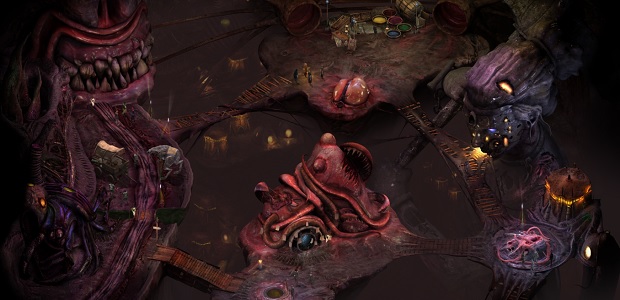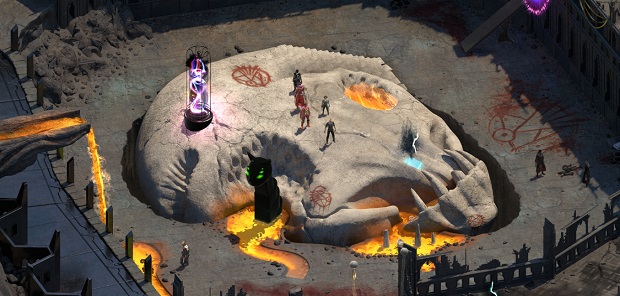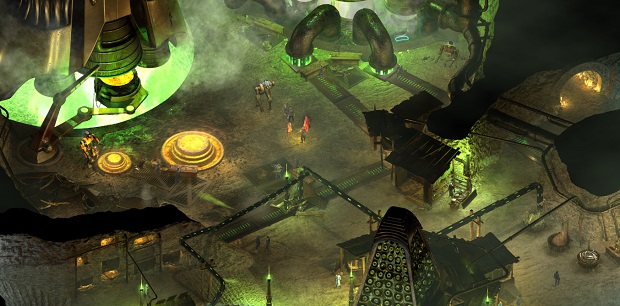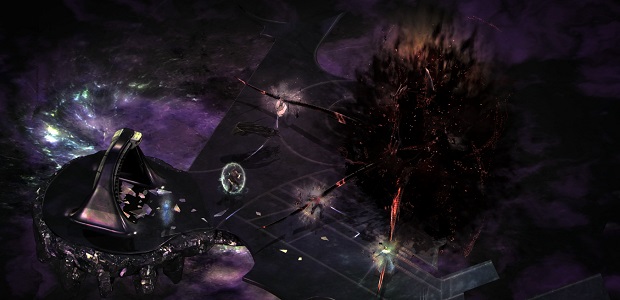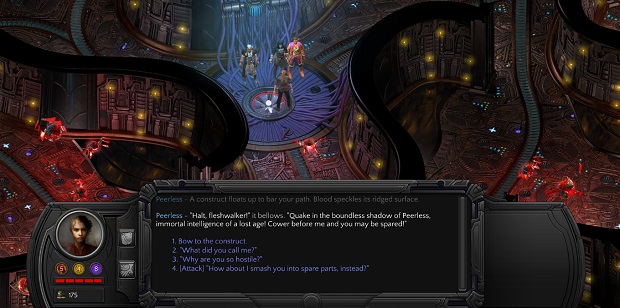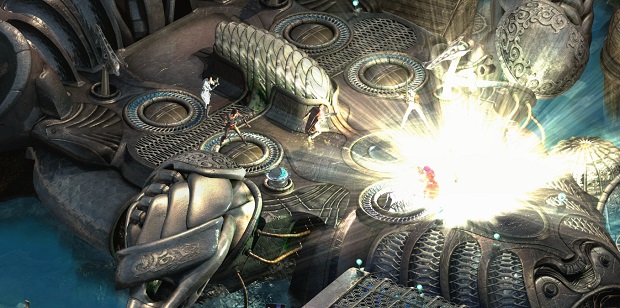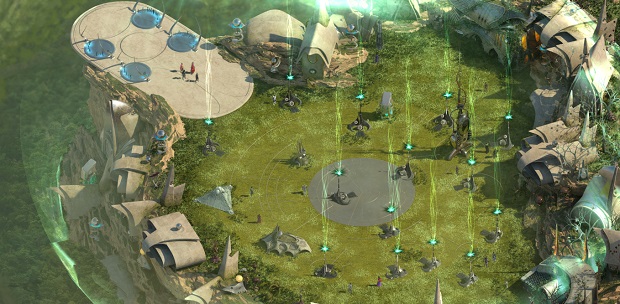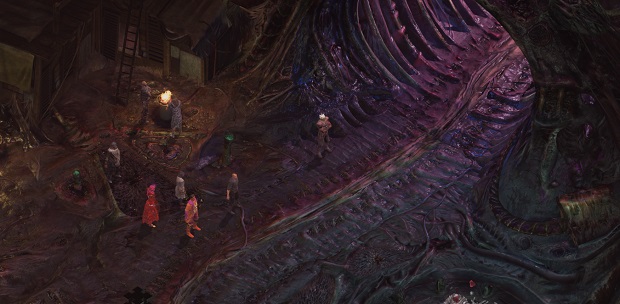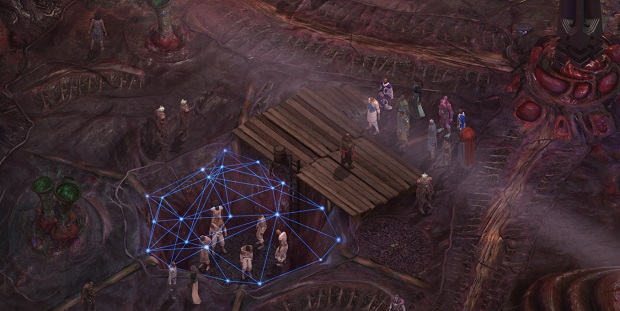Interview: Brian Fargo On Torment, Crowdfunding, The Future Of InXile And The Emotional Appeal Of RPGs
"It was like a referendum on my history"
At Gamescom, after a whirlwind tour of just a few of Torment: Tides of Numenera's [official site] many worlds, I sat down with inXile CEO Brian Fargo to talk about the past, present and future of his company, and of RPGs. As well as discussing Torment, I wanted to talk about Fargo's career as a whole, which spans 34 years, and covers the creation of the original Wasteland and Fallout, along with many other games, as well as three enormously successful crowdfunding campaigns in recent times.
He told me that the crowdfunding of Wasteland 2 had felt like "a referendum on [his] history" and that he'd like to explore original ideas once he has rebuilt trust with new versions of Wasteland, Torment and The Bard's Tale. Mostly, though, we talked about why making RPGs has retained its appeal over all these years, and how the business has changed since the early days of Interplay.
A little context:
Torment: Tides Of Numenera is like the RPG equivalent of a book of short stories that zip from horror to sci-fi to fantasy, and find time to explore all the spaces in between those genres. Actually, given that the game contains more text than the entire Harry Potter series, it's more like a bookshelf packed with stories than a single book. At Gamescom, writer Colin McComb, a veteran of Planescape Torment, conducted a whistlestop tour through some of the worlds that make up Numenera. Spacecraft were sabotaged, societies were digested, minds were fragmented. It's a dizzying array of scenarios and stories, and McComb is as enthusiastic a presenter as I've ever seen at a games convention. Immediately after that presentation, I spoke to Fargo.
RPS: I came here straight from watching Colin's presentation. It's the final day of Gamescom and I'm very tired, but that certainly woke me up.
Fargo: Isn't he great?
RPS: He has a lot of stories to tell, and so does Torment. When you have a setting in which anything is possible, how do you make sure there's cohesion? Do you set limits?
Fargo: Not at the beginning. My general philosophy of managing products is to shoot really high. "Let's go up here and over there!" I don't like to set the aim low because if it's too high we can always bring it lower later on, but if you start off setting your target low, you'll end up low.
I think that's one of the reasons this game can be really special and really epic is that we didn't set the bar low. We created all of this content and then we thought about bringing it all together, and making it a cohesive product. That's one of the reasons it's taken so long.
RPS: Is one of the ways you bring it together through the player character? Because it's a roleplaying game rather than just a setting, right? So the character presumably has a central story within all these other stories.
Fargo: In a roleplaying game, all the moving parts have to work together. I think that's why it's difficult because you have your attributes, conversations, items, inventory - and you need to make all of those things link up in a meaningful way.
I've always considered roleplaying games to be like the decathlon of games. You have to be really really good at a lot of different things to make them work, as opposed to say a straight-up strategy game where you just have to get one single thing right. We have to have a great combat system, character development system, and great writing on top of that.
RPS: In terms of the writing here, Planescape is a very melancholy game, horrific in places, but Tides, from what I've seen at least, seems to have a much more mischievous sense of humour about even its most grotesque moments. Would you say that's true?
Fargo: For me, some of the best wit and comedic moments come from the darkest places. When you introduce that darkness and then explore it, you can find the humour. One of my favourite lines is from Aliens, when they're waiting for evac and one of the marines says, about Newt, "Why don't you put her in fucking charge!?"
That was great. The situation is intense but you have this moment of comedy. So I would like to see more moments like that.
But this is primarily the same writing team that did Planescape Torment, so if you like those other moods that are in there, and that kind of vibe, you're going to feel all of that here. My attitude with this was to dial up the twisted, to make it not like anything people have played before. We call it a spiritual sequel, but that's only because we're hitting the same touchpoints - you won't play this and feel that it's derivative of Planescape Torment. It has its own feel.
RPS: What I've played of the Early Access release feels much more manic than Torment. It doesn't feel as...heavy?
Fargo: A little more manic, yeah. There's more of a sense of urgency, because of what's happening in the narrative.
What I love about roleplaying in general is that I find more than in any other category, we can hit different emotions. In a shooter I can frustrate you or make you feel elated, but there's not a wide range of emotions. In a good roleplaying game we can make you feel sad, or we can make you feel like an asshole. That, to me, is the beauty of it. And that's our goal with this.
With a lot of the games I've been involved with, there are people still playing ten years or twenty years later. We want to bury in so much content that you can still play it ten years later and find things you haven't seen before.
RPS: And a lot of that, in this case, is textual content. Lots of text. It always makes me a little sad when a writer has to click through their own dialogue quickly to get through a presentation...
Fargo: Well, having to describe this and present it here is like you saying to me, "Brian, tell me about Game of Thrones in fifteen minutes." And how do you get that across?
Torment has more content than all of the Star Wars movies combined, so trying to show that off in a timed presentation is not easy. But hopefully you get a good sense of the flavour of it here.
RPS: What are the challenges that you find when making a game like Torment that don't exist when you're working on something like Wasteland 2, which is a much more recognisable and cohesive single setting.
Fargo: That's an interesting question. With Wasteland 2, we're dealing with real world locations, which limits our ability to go off the deep end, so to speak. Creatively, there's a similar structure though; when I put these games together, I'm like the conductor in an orchestra, I have experts all playing their instruments, and I point to the them and have them do what they do.
A big part of my job is working out how to make sure all of the different aspects of that orchestra are talking to one another when they need to, and concentrating on their own expertise at other times. Somebody might have an area they they're working on and I'll say to them, "this is yours and you can do what you want, but all I need is that this one item is given to the player at some point in that area; I trust you to do whatever else you want to do, but I need that one item".
The trick is then that you have lots of different writers creating areas in a discrete way, on both Wasteland 2 and Torment, and then we have to bring it together as a cohesive unit. That's the unknown part of it. People say "why are these games late" - well, there's so much creativity going on and if you're going to be innovative, delays are part and parcel of the process sometimes. That's why I don't make any excuses about being late, because I just want to do a great project, and I know this is a process that has lot of unknowns to it.
No matter how many years you've been in the business, those unknowns exist. And what happens eventually, if you do this correctly, is that you end up with a game that is bigger than anything one human being could craft themselves. I don't take credit for these games - I'm just a guy who makes sure these geniuses all work and talk together, and have a common goal, whatever the project is, and that's what I love to do.
RPS: How hard was it to get all of these people back together for Torment. You have Mark Morgan, the guys from TSR...
Fargo: We have Patrick Rothfuss, Chris Avellone...
RPS: Everyone has Chris Avellone.
Fargo: (laughs) Well, it was a bigger deal at that time! You're right though. You got me on that one.
These guys I know I'm really passionate about this business and that I care about it, and that I want to do stuff for art's sake, and I want to do things that are pushing the RPG genre forward. I mean that truly; I'm not just some business guy, I love what I'm doing. And they trust me - they know I have their back and that I'm going to do everything I can to make the product right.
We're a very logical, fair, open organisation, and that's how I've always run my companies, and I think they appreciate that and they gravitate to it. We've all worked for bad bosses before and we know what it's like, so when you give these creative people an environment where they can thrive, then good things will happen. I focus very much on that atmosphere.
RPS: Is being able to offer the word 'Torment' a draw in itself though? It's part of their history, some of them, but also such a huge part of CRPG history, Planescape license or not. There aren't a lot of games that seem as friendly to writers as a Torment game might be.
Fargo: Yeah, Planescape Torment was a writers' project, as is this one.
RPS: And that must be attractive to these people?
Fargo: Yes. We can say to them, "you can do what you got into the videogame business to begin with."
RPS: And you talk about pushing RPGs forward - is putting writers to the fore part of that, do you think?
Fargo: I try not to put square pegs into round holes. There are some writers who are great writers but their design sensibilities aren't very good, and there are others who get the mentality of a gamer and understand design sensibilities, but their actual writing isn't as strong. And then there might be one guy whose dialogue is the best but he doesn't necessarily understand narrative flow. So to have this palette of people, and understanding everyone's strengths and weaknesses, and getting them to work together as a unit, relies on a lot of communication and instinct.
RPS: Presumably bringing in a great writer who doesn't understand game design so well, that's something that person will start to learn while working with the team?
Fargo: Absolutely. Nathan Long is a good example. He had played the games before but he'd never worked on a game before. We brought him on to Wasteland 2, and we had all these guys who understood writing for games, and he was sucking it all up. He was a writer, and a good one, but we saw promise in him as a writer specifically for games, and he's becoming that now.
RPS: When you look at some of the individual settings the writers are creating within Torment, do you ever think - "that could have been a full game!"
Fargo: Well, yes. But we never have a lack of ideas for what comes next. It's not like we go, "oh no, we ran out" (laughs).
RPS: So do you already know what the next project is going to be?
Fargo: I already have them super-excited about working on the next thing. Listen, they love this. but they've been on it for three and a half years. They've been writing it, thinking about it, talking about it. That's one thing you'll notice here - we don't have handlers for you to talk to, you talk to me, to the writers, to the producers. We don't have PR and marketing in between us, because we are right there on the nub and we love talking about what we do..
But like I said, they can't wait to move onto something else now. They're also looking forward to seeing what people make of what they've created though.
RPS: I'd like to talk about Early Access a little. When you first released games, they went out onto a disc, into a box, and they were pretty much done. That was it. There was no real opportunity for feedback from players to go back into the game. A thing was released and then it was out in the wild, on its own.
Fargo: Yeah, and it was a surprise to people!
RPS: That's another aspect to it as well. A few paragraphs and screens in a magazine isn't the same as constant internet coverage and community forums and the rest. How does all of that change your approach to making and releasing games?
Fargo: Well, I'll say this - the idea of going back to the way it used to be would scare the heck out of me because I love having that feedback from people. But some people have the misnomer that it's a democracy and that we're just going to let people vote on ideas - have a vampire in the game because the crowd wants it! - but it doesn't really work that way.
There's a large group of people, I'd say the majority, that still want the surprise. They don't want to read about it, they don't want to hear about it. That's great and those people are all waiting in the wings. But there's another group of people who are impatient, and they want to contribute as well, and I love that. For me it's a very simple thing, of taking feedback that we used to get post-ship and moving it to pre-ship.
Specifically with Torment, when we put it into Early Access, there were issues with pacing at the beginning. It was a little too slow, we were giving too much information, that first combat went on too long - which I already agreed with. When you're managing so many things, sometimes something will bother you a little bit but you have so many things bothering you that you let it slide for a while. The users pick up on it and a lot of the time they're reminding you of what you already knew.
RPS: The distinction between being reminded of something and being informed about something is important.
Fargo: Absolutely. You also can't help but lose a little objectivity when you live with something. When I'm playing my products, when they give me a build to play or whatever, I make sure to write everything down because if something bothers me, it might be very small and by the third playthrough it doesn't bother me anymore. I've quickly accepted it. And that does the game a disservice because the people who play it for the first time are going to notice it straight away.
RPS: Like the creaky step that I never fix. I only notice it when a guest steps on it for the first time and winces, but otherwise I don't even hear it anymore. What has kept your interest in RPGs over all these years? Do you never want to switch to a new genre?
Fargo: I still find them the absolute most fascinating genre, for the reasons I said earlier. I can make you fall in love with an NPC and you could meet someone else later who is tactically far superior, but you'll hang onto the first guy, because you like him. It makes no logical sense why you wouldn't swap him out, but you stick with him.
That to me is the essence of an RPG. We can make you make illogical decisions based upon your emotions.
RPS: And are you as interested in RPG systems as you are in character and narrative?
Fargo: I'm more interested in the psychology and the sociology and the narrative aspects that emerge from the systems. For example, it's not exactly an RPG, but I found DayZ fascinating. As a sociological experiment, that is fascinating.
That's what I'm most interested in when I look at ways of making people relate to one another, whether those are real or fake people - I find that fascinating. More so than the systems themselves.
RPS: I roleplay in strategy games. I'll make an illogical choice to preserve the sense of what my nation or my character is. Something like Crusader Kings is a roleplaying game, to a great extent...
Fargo: I remember when I played XCOM - which I loved - I got to the end of a mission and I didn't want to go back, I wanted to keep going further into the world. I didn't want to go back to the ship and then go out and see another part of the world, I wanted to go behind the next door and see what was over there, and be part of a single world rather than lots of fragments of a world.
That isn't a criticism. But parts of XCOM are RPGesque and that makes me want more of the RPG experience from it.
RPS: You should do an XCOM RPG. Traditionally, RPGs are fantasy or sci-fi, but I'd love to see an RPG that explores soap opera elements, romantic comedy, murder mystery. There's a sort of gaming canon - Star Wars, Lord of the Rings, D&D, Mad Max, Lovecraft - and I'd love to see RPGs reach outside that.
Fargo: One of my goals is to do original stuff. People say you're doing Torment, Wasteland, Bard's Tale - but I do want to do original things as well. The fact is, I'm slowly rebuilding my cachet of belief and support. "What have you done for me lately?", people might say. I can't just point back to Fallout or Wasteland.
The more we establish InXile's name, with wonderful products, people will trust us to do something brand new. I think I need recent roleplaying success to be able to build that trust.
RPS: Did you ever expect to be in a position where you could rebuild that trust using Wasteland and Torment?
Fargo: I got the Wasteland name in 2002, and I felt there was an audience that wanted that product. I practically cried when Wasteland 2 got funded, because I knew that not only was it going to allow me to get back doing what I like to do, it was also a referendum on my history. It was like people saying, "Brian, we like what you've done and we believe in you and support you". That was meaningful to me.
That's why we wanted to over-deliver on Wasteland 2. What I didn't want was somebody to go, "I got Wasteland 2 and, you know what, he checked all the boxes. He delivered it but it was uninspiring."
I wanted to over-deliver and I think we did, and I think with Torment we're going to over-deliver, so that people are proud of supporting us. Look, your name is everything. We want to be proud of that name.
RPS: Thanks for your time.
Torment: Tides Of Numenera will be released next year but is already available in Early Access.

